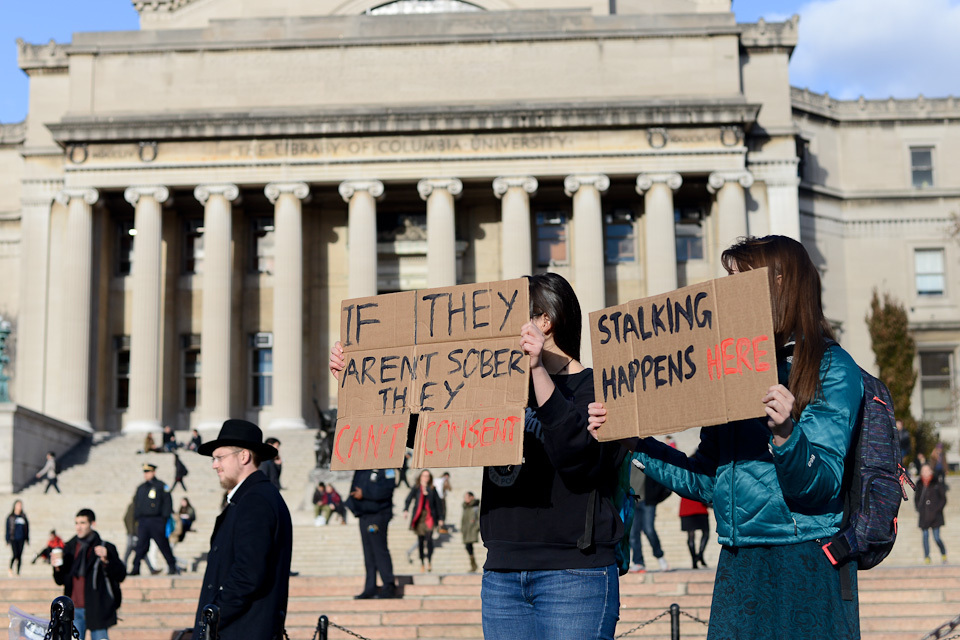During a forum hosted by the Multicultural Affairs Advisory Board on Literature Humanities last semester, a student shared an experience with an audience of instructors and fellow students. This experience, she said, came to define her relationship to her Lit Hum class and to Core material in general.
During the week spent on Ovid’s “Metamorphoses,” the class was instructed to read the myths of Persephone and Daphne, both of which include vivid depictions of rape and sexual assault. As a survivor of sexual assault, the student described being triggered while reading such detailed accounts of rape throughout the work. However, the student said her professor focused on the beauty of the language and the splendor of the imagery when lecturing on the text. As a result, the student completely disengaged from the class discussion as a means of self-preservation. She did not feel safe in the class. When she approached her professor after class, the student said she was essentially dismissed, and her concerns were ignored.
Ovid’s “Metamorphoses” is a fixture of Lit Hum, but like so many texts in the Western canon, it contains triggering and offensive material that marginalizes student identities in the classroom. These texts, wrought with histories and narratives of exclusion and oppression, can be difficult to read and discuss as a survivor, a person of color, or a student from a low-income background.
The MAAB, an extension of the Office of Multicultural Affairs, is an advocacy group dedicated to ensuring that Columbia’s campus is welcoming and safe for students of all backgrounds. This year, we explored possible interventions in Core classrooms, where transgressions concerning student identities are common. Beyond the texts themselves, class discussions can disregard the impacts that the Western canon has had and continues to have on marginalized groups.
For example, another student who attended the forum shared that her Lit Hum professor gave her class the opportunity to choose their own text to add to their syllabus for the year. When she suggested the class read a Toni Morrison text, another student declared that texts by authors of the African Diaspora are a staple in most high school English classes, and therefore they did not need to reread them. Toni Morrison is a writer of both the African Diaspora and the Western world, and her novels—aside from being some of the most intellectually and emotionally compelling writing in the last century—should be valued as founding texts of the Western canon.
The student’s remark regarding Toni Morrison was not merely insensitive, but also revealing of larger ideological divides. This would have been an opportune moment for the professor to intervene.
The MAAB has held two forums in our On the Core series and had multiple meetings with professor Roosevelt Montás, the director of the Center for the Core Curriculum. The goal of the forums on Literature Humanities and Contemporary Civilization was to give students, professors, and faculty a space to hold a safe and open dialogue about experiences in the classroom that all too often traumatize and silence students. Repeatedly, we heard from students who demonstrated that having difficult experiences in a Lit Hum or Contemporary Civilization class may actually be part of the norm. Unfortunately, not all professors seem equipped to be effective facilitators in the classroom.
Students need to feel safe in the classroom, and that requires a learning environment that recognizes the multiplicity of their identities. The MAAB has been meeting with administration and faculty in the Center for the Core Curriculum to determine how to create such a space. The Board has recommended three measures: First, we proposed that the center issue a letter to faculty about potential trigger warnings and suggestions for how to support triggered students. Next, we noted that there should be a mechanism for students to communicate their concerns to professors anonymously, as well as a mediation mechanism for students who have identity-based disagreements with professors. Finally, the center should create a training program for all professors, including faculty and graduate instructors, which will enable them to constructively facilitate conversations that embrace all identities, share best practices, and think critically about how the Core Curriculum is framed for their students.
Our vision for this training is not to infringe upon the instructors’ academic freedom in teaching the material. Rather, it is a means of providing them with effective strategies to engage with potential conflicts and confrontations in the classroom, whether they are between students or in response to the material itself. Given these tools, professors will be able to aid in the inclusion of student voices which presently feel silenced.
Students at the forum expressed that they have felt that Literature Humanities and Contemporary Civilization’s curricula are often presented as a set of universal, venerated, incontestable principles and texts that have founded Western society. Such a presentation does not allow room for their experiences in the Western world or in class discussions. While these founding principles have been liberating in many ways, instructors should more consistently acknowledge during class discussions that many of these same principles have created an unjust, unequal, and oppressive existence for many, as Professor Montás has suggested during our forums.
One of the defining elements of a Columbia education is the Core. The Center for the Core Curriculum, professor Montás, and many instructors have been receptive to our feedback and expressed dedication to addressing these issues. Altering the Core Curriculum is another important discussion—one that would undoubtedly require the insight of the larger student body. In the meantime, we hope that our recommendations will enable students to have a more intellectually rewarding experience in their classrooms.
The authors are members of the Multicultural Affairs Advisory Board. Tracey Wang is a former news deputy for Spectator.
To respond to this op-ed, or to submit an op-ed, contact opinion@columbiaspectator.com.












